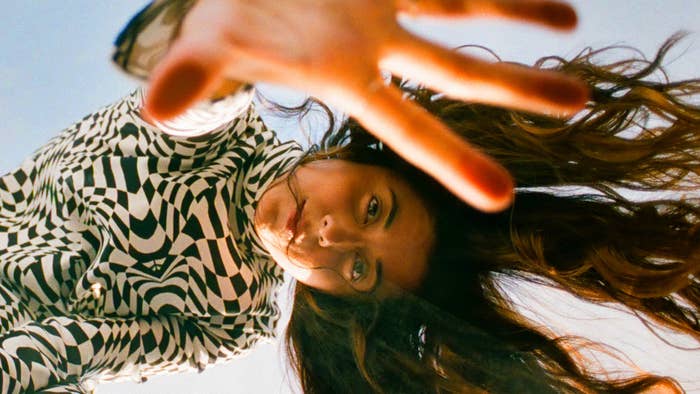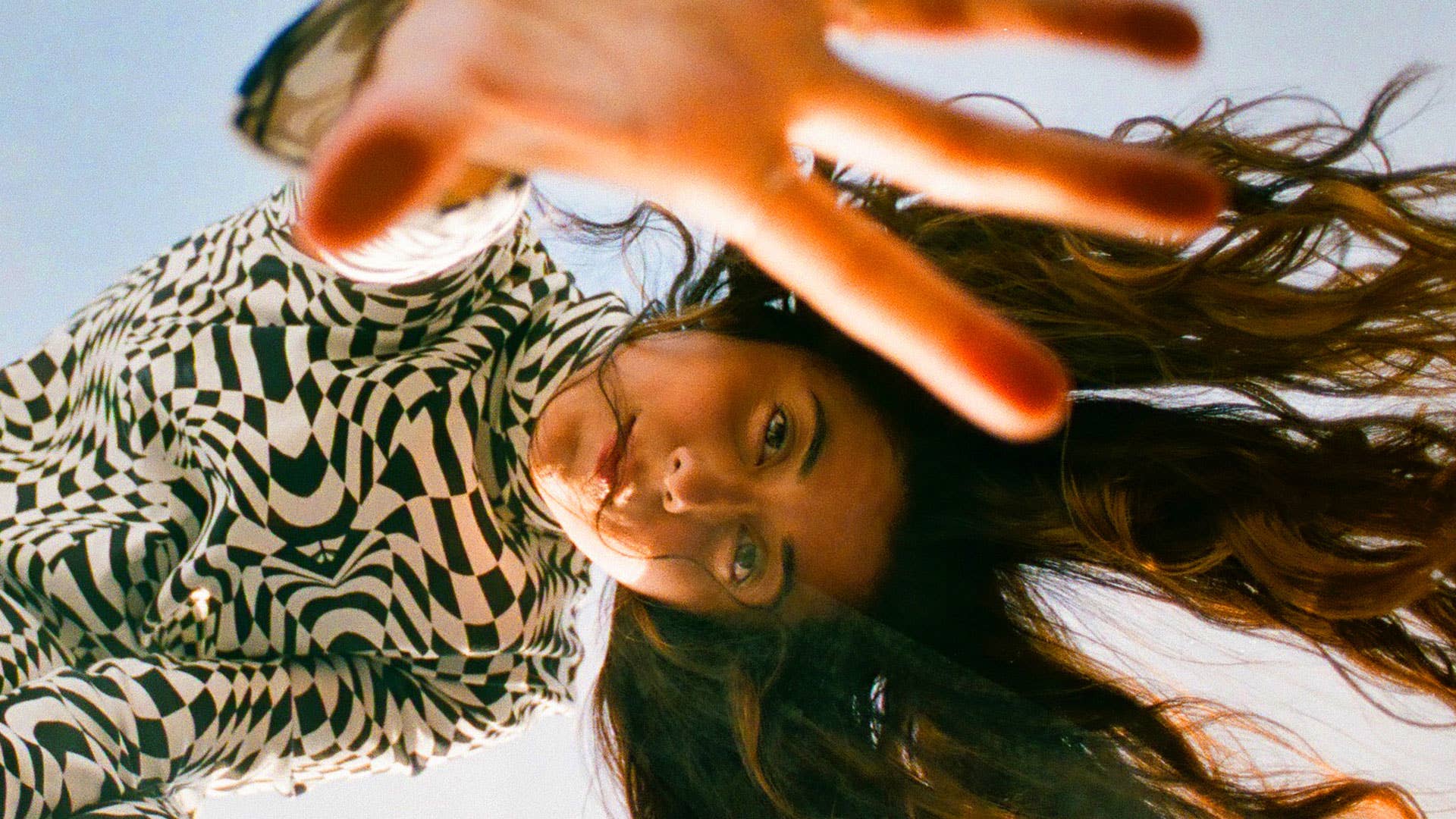
“I’ve missed them terribly during COVID—like horribly,” laments Daniela Andrade about being separated from her family during quarantine. “I was just talking about this with my sister last week.” She remembers that distance—social or geographic—can sometimes be easily overcome. “We were on a call and she said, ‘It’s so nice to be able to talk about our problems.’”
Staying connected with her family back in Edmonton, where she grew up, has been tough, she says, and every new opportunity to do so has become even more cherished. In response to the pandemic, Andrade has reevaluated the importance of being present for her siblings and parents, focusing on contributing to their relationships in ways she might have taken for granted prior to the lockdown. Through active communication, her feelings of appreciation for the people that raised her have intensified. “I don’t know what can happen; COVID is so freakin’ scary,” she says.
The 28-year-old Honduran-Canadian artist joins me over Zoom from her apartment in Montreal to speak on her latest effort Nothing Much Has Changed, I Don’t Feel The Same. Since leaving Edmonton, and after some time spent in Toronto, the singer-songwriter has returned to her birthplace to work on her music. The resultant six-track EP appropriately focuses on the collective feelings of anxiety and isolation the world has been experiencing. Andrade is here to talk about it while offering up potential remedies through a range of comfortably relatable topics.
At the end of August, Complex Canada premiered the lead single “Puddles” off the project, providing a first-hand look at what exactly Andrade has been up to during lockdown. Conceptually speaking, this release is a departure from her last EP Tamale, which was a scintillatingly lush ode to her family and heritage as a Honduran woman. “Tamale was really internal—figuring out who I was as a starting point for the rest of my projects. I think [it was] the deepest I’ve ever gone into asking my family questions; whereas Nothing Much Has Changed, I Don’t Feel The Same was me alone in my apartment, thinking about calling people, and feeling a lot of detachment.”
"I want people's imaginations to take them where they need to go."
Sonically, her new project is pensively sincere. Soothingly hushed vocals quell the cacophony of emotions felt welling up in everyday life, while her lyrics provide an escape from the unknowns of tomorrow. Reminders of yesteryear shine through the haze of electronica and vividly soulful instrumentation found across an auspiciously tight runtime of 11 minutes and 11 seconds. This is the sound Andrade has built up from the beginning of her career. The only problem being that now she has to go back to reaping the benefits from the comfort of her home instead of on a stage.
In 2008, she began posting covers on YouTube—tranquilizing interpretations of songs like Gnarls Barkley’s “Crazy” and Radiohead’s “Creep” exploded in popularity—and to date, she has garnered over 300 million views and counting. After this early success, Andrade felt confident enough to venture into more original work, releasing her first two EPs with Things We’ve Said in 2012, and Shore in 2016. Her last major breakthrough came when her critically acclaimed EP Tamale dropped last October. This year, however, has been different. Nothing Much Has Changed, I Don’t Feel The Same is a product of necessity born out of isolation, and Andrade is finally tired of being on her own.
This feeling of loneliness, or seclusion, is fittingly accentuated on the EP’s outro “Alone.” As on the title track, Andrade acknowledges her own level of discomfort within the current climate, emphasizing, “It’s an unsettling emotion and I’m okay with that feeling being there.” Instead of accepting defeat, she’s decided to press on and persevere, explaining, “I think the loneliness we’ve all deeply felt during this time is just a way to go in. It fucking hurts but we gotta.”
At the beginning of lockdown, Andrade was initially feeling “quite positive” and decided to make “a ton” of music while quarantining. She took it as an opportunity to work on her debut album, be productive, and do as much as she could, but quickly discovered her creativity was burning out. “I was kind of hitting a point [where] it totally changed my outlook on why I was making an album and doing music. I had to take a pause and check with my intention and I wanted to have fun. That’s when ‘Puddles’ was written—after I made that choice.”
Since then, she’s been learning how to skateboard, reading Breasts and Eggs by Mieko Kawakami and Freedom and Indigenous Constitutionalism by John Borrows, while listening to bossa nova singer Astrud Gilberto and being inspired by the Latin trio Los Panchos. She tells me these inert emotions will eventually pass, and just like any other traumatic experience, it’s going to take time and effort to get over. “I think that there's a peak of feelings—like a concentration of it—and then the struggle is sitting with that and letting it diffuse and pass through you, which is beautiful when it does happen.”
In search of an alternative solution, I jokingly ask her if she thinks it’s a good idea to reach out to exes like the song “K.L.F.G.” suggests. Amused, she stops my question point-blank, exclaiming, “Don’t do it!” She says it’s probably better to avoid the temptations of quarantine altogether and that a seemingly innocent idea now usually reveals itself to be a worse idea later.
Andrade goes on to explain that the songs found on Nothing Much Has Changed, I Don’t Feel The Same are best described as vignettes, or “pieces of days,” and “how this block of time felt.” Her hope is that this project is relatable and conveys a sense of impermanence for better or for worse. Finishing her thought, she reminisces on a book she found in New York—from a forgotten author who wrote down his dreams after waking up—by comparing it to the EP: “Sometimes he wouldn't even finish his sentences because sometimes that's where his dream stopped. It leaves off [on] this streaming idea of where it could have gone, and I want people's imaginations to take them where they need to go.”
At a time where uncertainties lie around every corner, and bad decisions are one step away, Andrade is consciously aware that family and friends are what help keep her anchored to reality. When asked what it was like working with her father on “Sin Ti,” she recalls his sanguinity on separation: “My dad said it doesn’t have to be negative, it can be positive. People can grow out of a situation where they’re left.” And born out of this optimism, a poetic sense of hopefulness can be heard in the song. “The lyrics are talking about how when someone leaves, they take the sun and the flowers. But then that leaves the moon, which creates a pull and the tide grows.”
And like the moon, Andrade gravitated to the Spanish word acábame during the making of “Deseo.” It’s a complicated term with a variety of meanings, but in this case, she says it means when “something’s been taken from you completely and you let it be taken from you.” This notion, like the song itself, is a veritable metaphor for what we’ve all lost, or given up, during the pandemic. In the romantic sense of the word, it’s exactly what Andrade hopes we can reclaim—to be able to reconnect with the loved ones who have temporarily left our lives for an undetermined amount of time.
Andrade’s latest effort, then, is a revivification of sorts—or rather, a reminder that life goes on. The trauma of quarantine has left us all seeking out solace, or respite, from the hammering of daily safety concerns, the governmental protocols restricting our movements, relationships, and livelihoods. Like the rest of us, Andrade’s focus shifted from what she was planning to do in favour of what she needed to do. It’s a reactionary response, but when faced with a massively existential roadblock like COVID-19, feelings change. “This is a reality,” she says. “Life is not the same.”




